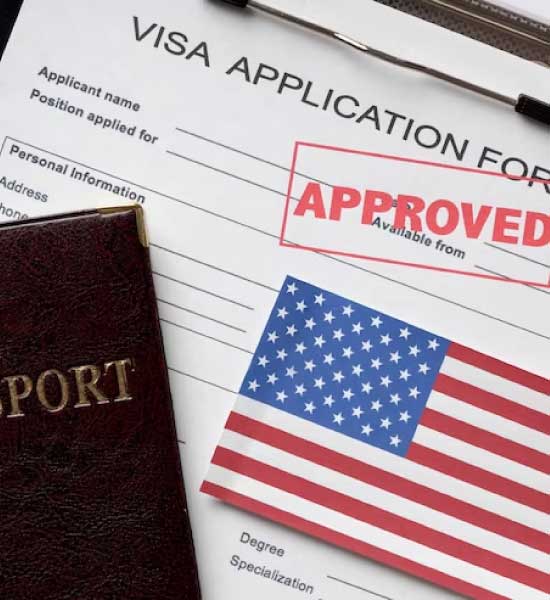
A USA work permit, also known as an Employment Authorization Document (EAD), is a legal document that allows non-U.S. citizens to work in the United States for a specific period. It’s typically granted to immigrants, refugees, and certain visa holders (like H-1B or L-1) who are authorized to work during their stay. To obtain a work permit, individuals need to apply through the U.S. Citizenship and Immigration Services (USCIS) and meet specific eligibility criteria. The work permit is tied to a particular employer or employment type and is renewable. It offers foreign workers the opportunity to contribute to the U.S. labour market temporarily.
USA work immigration offers a multitude of benefits.

There is a range of USA worker visas categorizing temporary and permanent workers. here are some of the most common USA work immigration options:
This category of nonimmigrant status pertains to individuals aiming to provide their expertise in a specialized field of work, offer services of remarkable skill and talent connected to a Department of Defense (DOD) collaborative research and development initiative, or engage in work as an exceptionally skilled or talented fashion model. Our USA work visa consultant at Fly High Abroad Dubai can assist with all the procedures.
You qualify if you are the H-4 dependent partner of an H-1B nonimmigrant. Following circumstances should be related to your H-1B spouse:

The L-1A nonimmigrant category allows a U.S. employer to relocate an executive or manager from a linked foreign office to a U.S. office. This classification also permits a foreign corporation without an associated U.S. office to send a manager and executive to the U.S. to create one. The employer is required to submit a Form I-129, which is a petition for a nonimmigrant worker, along with the associated fee, on behalf of the employee.
Employees meeting the necessary criteria who arrive in the United States to set up a new office will be granted an initial stay of up to one year. Other eligible employees will have an initial stay of up to three years. Extensions of stay for all L-1A employees can be approved in segments of up to two years each until the total duration reaches the maximum cap of seven years.
Individuals serving in religious vocations and occupations, both those in ministerial and non-ministerial roles, are eligible to enter the U.S. on a temporary basis in the R1 category. They should come with the intention of engaging in religious activities.
An R-1 nonimmigrant refers to a foreign individual who is entering the United States temporarily with the purpose of working, at minimum part-time (averaging at least 20 hours per week), in the capacity of either a minister or in a religious occupation or vocation.
To be eligible, you need to have been an active member of a religious denomination with a legitimate non-profit religious organization based in the U.S. for a period of at least two years immediately preceding the submission of the petition.
If you are a noncitizen possessing extraordinary abilities, an exceptional professor or researcher, or a specific multinational executive or manager, you can apply for a first-preference employment-based visa (EB-1). Each of these professional categories entails specific criteria that must be satisfied. Ask our USA work visa consultants for further information.
If you belong to the group of professionals possessing an advanced degree or its equivalent, or if you are an individual with exceptional ability, then you may meet the criteria for second preference EB-2.
EB-3 immigrant visa third preference category might apply to you if you fall under the categories of skilled worker, professional, or other worker and meet the eligibility requirements. In most cases, third preference petitions need to be submitted along with an endorsed individual labour certification from the Department of Labour on Form ETA-9089.
The fourth preference (EB-4) visa is eligible for special immigrants such as Religious workers, Special Immigrant Juveniles, Specific broadcasters, Designated retired officers or employees of a G-4 international organization or NATO-6 civilian employees, along with their family members, Designated U.S. government employees stationed abroad, and their family members, Members of the U.S. armed forces, Individuals employed by the Panama Canal Company or Canal Zone Government, Certain physicians who were licensed and practising medicine in a U.S. state as of January 9, 1978, Noncitizens who have provided information about a criminal organization or enterprise, or a terrorist organization, enterprise, or operation (S nonimmigrants).
EB-5 is a fifth preference visa having an Immigrant Investor Program. In 1990, the EB-5 Program was established by Congress with the goal of boosting the U.S. economy by attracting foreign investors who would contribute to job creation and capital investment. Following this, in 1992, Congress introduced the Immigrant Investor Program, referred to as the Regional Center Program. This program allocates EB-5 visas for individuals who invest in commercial ventures connected to regional centres that have gained approval from USCIS.
For comprehensive and current details, explore “Fly High Abroad Dubai.” We can guide you through all the information and eligibility criteria. We’re here to guide you through every step of your US work visa.
FREE ASSESSMENT
HEAD OFFICE - DUBAI 🇦🇪
Copyright © 2024 All Rights Reserved.